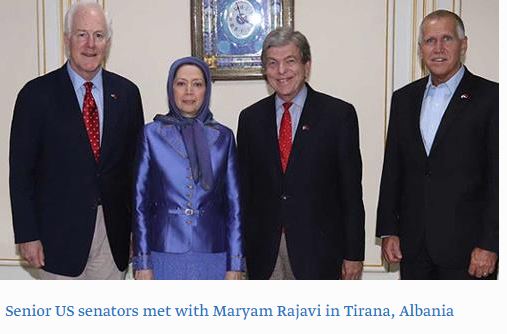Dr. Majid Rafizadeh is one of the famous
analysts and writers
Let me review his article together.
BY Dr. Majid
Rafizadeh
Iranian opposition is gaining momentum due to a growing
consensus in the US Congress over the necessity for regime change in Iran. A
senior delegation of US senators went to Albania’s capital Tirana this week to
meet Maryam Rajavi, who heads the National Council of Resistance of Iran
(NCRI), a political coalition calling for regime change in Iran and considered
the main threat to the ruling mullahs.
They also met members of the People’s Mojahedin of Iran
(MEK), the main member of this varied coalition of groups and individuals. The
high-profile visit comes at a time when Washington has slapped major new
sanctions on Iran, including its Revolutionary Guard Corps (IRGC), for its
ballistic missile drive, its support for terrorism and its human rights
violations. Given that the IRGC controls over 40 percent of Iran’s economy,
these new sanctions are a heavy blow to Tehran’s ambitions.
Ties between Iran’s opposition and US officials are
strengthening, and the number of high-level officials supporting the opposition
is rising. They recognize the opposition as a legitimate representative of many
Iranians who seek democracy in their country. Rajavi expressed her gratitude
for the US Senate’s tireless efforts to protect thousands of MEK members in
Iraq and relocate them to Albania.
Previously, in a Senate briefing, several US officials
strongly condemned Iran’s destructive role in Iraq. Sen. Roy Blunt joined an initiative
demanding the urgent transfer of MEK members stationed in a former US military
base known as Camp Liberty near Baghdad.
Tehran fears the opposition’s soft power
more than the hard power of foreign governments. That is why Iranian leaders
and media outlets react forcefully and anxiously to such visits and opposition
activities.
Dr. Majid Rafizadeh
In April, Sen. John McCain, a longtime supporter of the
Iranian opposition, visited the MEK in Albania and met with Rajavi. MEK members
were able to leave Iraq after a four-and-a-half-year ordeal in Camp Liberty
following their forced transfer from their 26-year home in Camp Ashraf,
northeast of Baghdad.
From 2009, following the transfer of security from the US
military to the Iraqi government, the MEK came under eight major ground and
rocket attacks by Iran-backed proxies against Ashraf and Liberty. This was in
parallel with a seven-year siege. After losing more than 160 of their
colleagues to the attacks and blockade, MEK members were finally able to leave
Iraq for European countries, mainly Albania.
This latest visit sends a strong signal to Tehran that
the NCRI is gaining momentum. This time last year, Tehran was hell-bent on
destroying the MEK. Now the tide has turned, with the opposition on the offensive.
Tehran fears the opposition’s soft power more than the
hard power of foreign governments. That is why Iranian leaders and media
outlets react forcefully and anxiously to such visits and opposition
activities. The opposition can be a very powerful tool to pressure Tehran
without the need for direct military confrontation.
• Dr. Majid Rafizadeh is a Harvard-educated,
Iranian-American political scientist. He is a leading expert on Iran and US
foreign policy, a businessman and president of the International American
Council. He serves on the boards of the Harvard International Review, the
Harvard International Relations Council and the US-Middle East Chamber for
Commerce and Business. He can be reached on Twitter @Dr_Rafizadeh.






Comments
Post a Comment